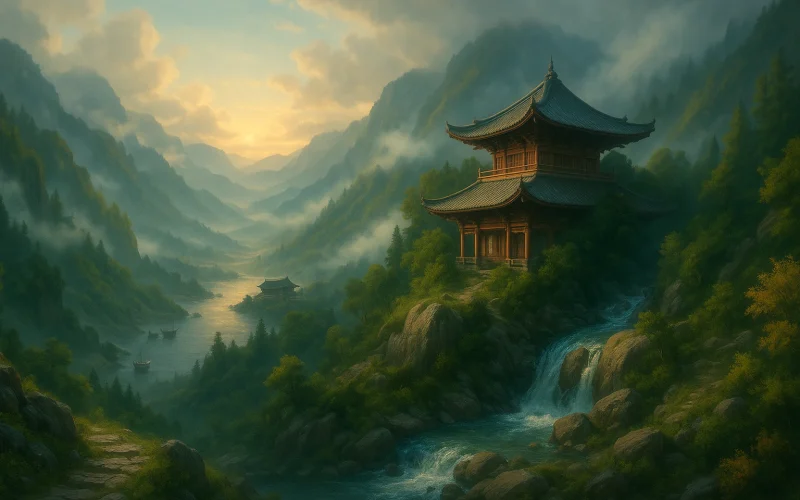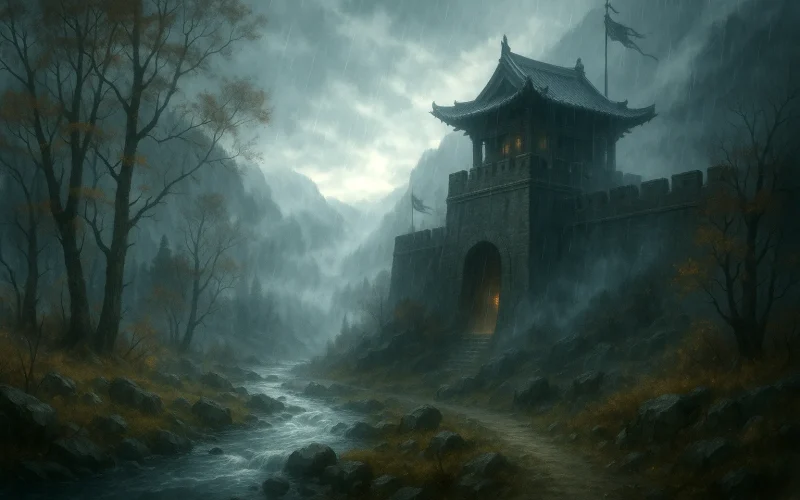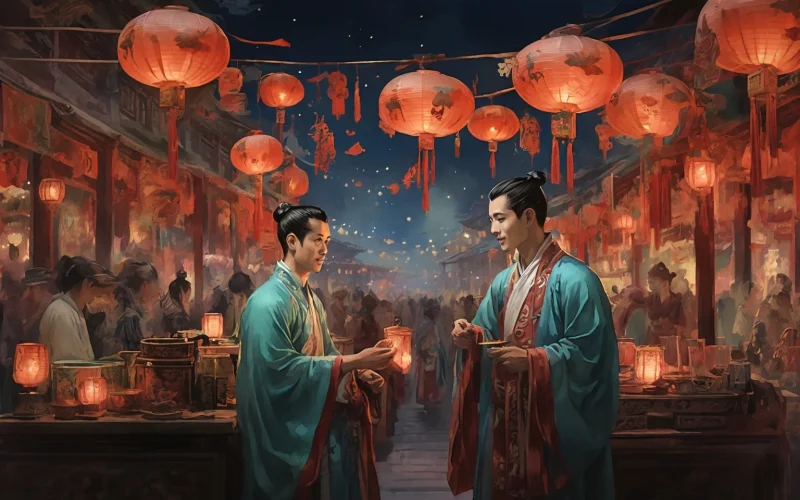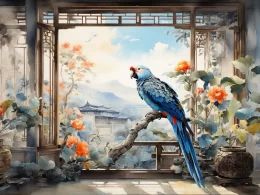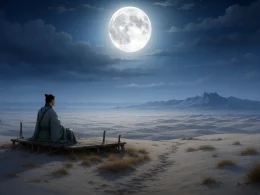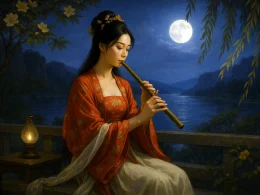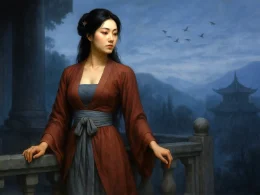A jest about pilgrims' hurried whips—
Yet here even I must pause my lips.
Sun hugs the temple at cliff's midriff,
Cloud-milk feeds stone's hidden glyph.
Wooden sandals path to northern grove,
Anchored sails dot the eastern cove.
Min Dynasty's pomp lies entombed,
While rice fields to monastic altars bloomed.
Original Poem
「圣泉寺」
曾巩
笑问并儿一举鞭,亦逢佳景暂留连。
青冥日抱山腰阁,碧野云含石眼泉。
蹑屐路通林北寺,落帆门系海东船。
闽王旧事今何在,惟有村村供佛田。
Interpretation
Composed during the Xining era of Emperor Shenzong's reign when Zeng Gong served in Fujian, this poem captures his inspection tour to the historic Sacred Spring Temple near Fuzhou. This scenic site, surrounded by mountains and rivers, was once connected to the Min Kingdom's royal legacy. Zeng's visit inspired this meditation on vanished kingdoms and enduring landscapes, blending natural beauty with historical contemplation.
Composed during the Xining era of Emperor Shenzong's reign when Zeng Gong served in Fujian, this poem captures his inspection tour to the historic Sacred Spring Temple near Fuzhou. This scenic site, surrounded by mountains and rivers, was once connected to the Min Kingdom's royal legacy. Zeng's visit inspired this meditation on vanished kingdoms and enduring landscapes, blending natural beauty with historical contemplation.
First Couplet: "笑问并儿一举鞭,亦逢佳景暂留连。"
Xiào wèn bìng ér yī jǔ biān, yì féng jiā jǐng zàn liúlián.
With a laugh, I signal my attendant with raised whip;/ Finding fair scenery, we pause our trip.
The casual gesture and spontaneous stop establish the poet's leisurely approach, framing the subsequent observations.
Second Couplet: "青冥日抱山腰阁,碧野云含石眼泉。"
Qīngmíng rì bào shānyāo gé, bì yě yún hán shí yǎn quán.
Azure skies embrace the mountainside tower;/ Emerald fields cradle cloud-veiled spring in stone bower.
Vivid personification through "embrace" (抱) and "cradle" (含) animates the landscape, revealing the temple's harmonious setting between heaven and earth.
Third Couplet: "蹑屐路通林北寺,落帆门系海东船。"
Niè jī lù tōng lín běi sì, luò fān mén xì hǎi dōng chuán.
Wooden clogs trace paths to northern woods;/ Tied sails at the gate mark eastern maritime goods.
The concrete details - wooden shoes (蹑屐) and moored ships (落帆门) - testify to the temple's dual role as spiritual sanctuary and commercial hub.
Fourth Couplet: "闽王旧事今何在,惟有村村供佛田。"
Mǐn wáng jiù shì jīn hé zài, wéi yǒu cūn cūn gòng fó tián.
Where now are Min Kingdom's ancient affairs?/ Only village rice fields for Buddha's prayers.
The rhetorical question underscores historical transience, contrasting vanished political glory with enduring religious devotion through the "Buddha's fields" (佛田) still tended by local communities.
Holistic Appreciation
This work masterfully blends natural landscapes, cultural history, and contemporary observation, unfolding through a sequence of "ascending—viewing—reflecting." The first six lines, with their light tone and delicate imagery, sketch a serene and ethereal mountain temple scene. The layered descriptions—a mid-mountain pavilion, a spring bubbling from stone crevices, forest paths, boats moored by the shore—create both visual beauty and a sense of lively motion. The final couplet takes a sharp turn, recalling the bygone era of the Min Kingdom rulers, using history to critique the present. This shift transforms the poem from mere sightseeing into profound contemplation, mirroring the poet's "sense of rise and fall" and his endless melancholy about the passage of time.
Artistic Merits
- Nature and Culture Intertwined, Vivid Descriptions
Zeng Gong excels at merging the beauty of nature with historical depth, embedding history within scenery and emotion within narrative. Phrases like "azure skies embracing the sun" and "clouds cradling the stone's eye" are dynamic and painterly, brimming with visual appeal. - Balanced Structure, Progressive Layering
From riding on horseback to pausing for views, from visiting ancient temples to being moved by the scenery, the poet deftly orchestrates rhythmic shifts. The poem flows smoothly without stagnation, seamlessly blending scene and sentiment while naturally transitioning in mood. - Historical Reflection in Closing, Profound and Melancholic
The final couplet abruptly introduces a sense of past and present. The line "Where now are the old affairs of the Min kings?" is both a nostalgic query and a lament for the changes of time; "only village after village offering temple fields" hints at the stark reality of religion replacing governance and history reduced to relics, showcasing the poet’s penetrating historical insight.
Insights
This poem allows us to feel the intersecting beauty of natural scenery and historical culture, while also inspiring us to carry a sense of history when appreciating landscapes, contemplating the cycles of rise and fall. Zeng Gong, with his plain yet profound expression, uses scenery as a vessel to convey reflections on life and history, prompting us to ponder the impermanence of human affairs and the enduring significance of the spirit.
About the Poet
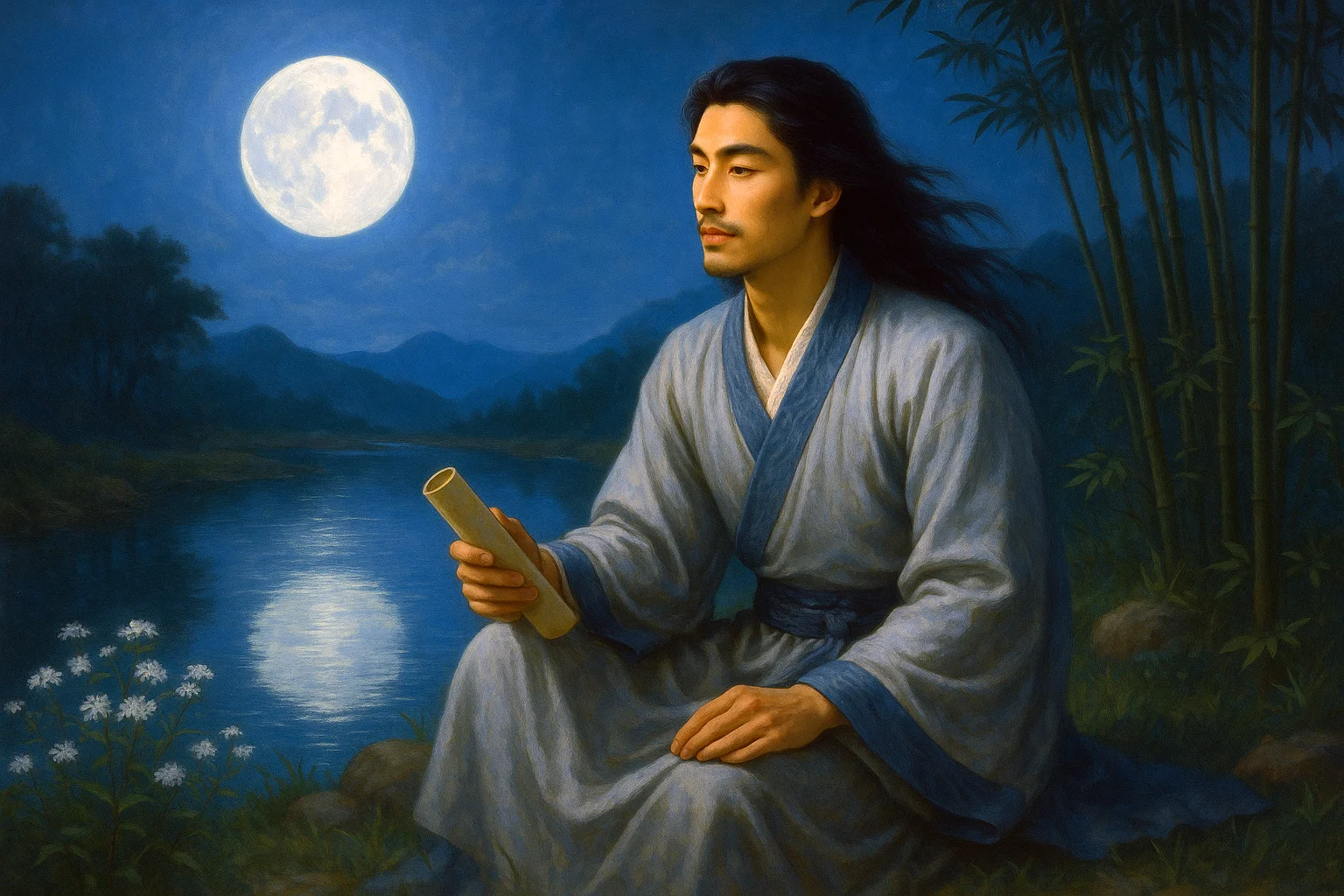
Zeng Gong (曾巩, 1019 - 1083), a native of Nanfeng in Jiangxi province, stands among the illustrious "Eight Great Masters of Tang-Song Prose." His writings distinguished themselves through an elegant classical balance, celebrated for their rigorous argumentation and refined literary craftsmanship. While his poetry embraced an artless subtlety, his prose achieved what critics hailed as "the very essence of purity" - an achievement that, though perhaps less dazzling than his contemporaries like Su Shi or Wang Anshi, earned him posthumous reverence as the founding master of the "Nanfeng Literary School."






